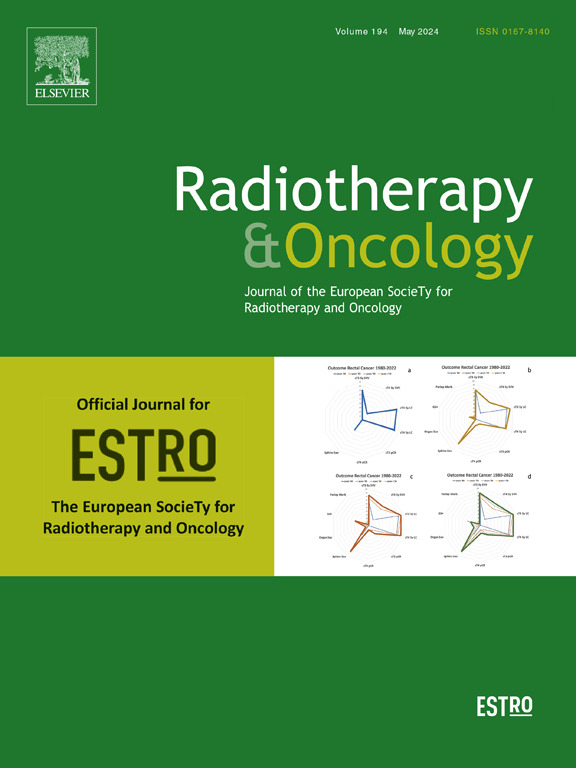Longitudinal analysis of cognitive function in patients treated with postoperative radiotherapy for grade 2 and 3 IDH mutant diffuse glioma
IF 4.9
1区 医学
Q1 ONCOLOGY
引用次数: 0
Abstract
Background
Postoperative radiotherapy and chemotherapy improve survival in IDH mutant diffuse glioma. We investigated whether neurocognitive function declines over time, and whether mean dose to the brain outside of CTV (mean brain dose) is related to neurocognitive function.
Patients and methods
Patients that underwent resection and postoperative radiotherapy for grade 2 or 3 IDH mutant diffuse glioma were tested using the Hopkins Verbal Learning Test, Letter Fluency and Trail Making Test before surgery and afterwards up until disease progression. Mixed effects models were fitted for each of three cognitive test scores, using time from surgery, mean brain dose, CTV volume, and tumor grade as fixed effects.
Results
Between 1–10-2013 and 31–12-2022, 49 patients underwent longitudinal neurocognitive testing. Average mean dose to brain minus CTV was 17.8 Gy (95 % CI 16.1 – 19.4). At the time of analysis, median follow-up in patients free from disease progression was 5.8 years (range 1.1 – 20.8). Attrition rate during the first five years of follow up was 14.1 %. There was no decline of test performance over time (p ≥ 0.526). However, there was a negative effect of increasing mean brain dose on TMT score A (−0.11, p = 0.008) and TMT score B (−0.13, p = 0.004).
Conclusions
In this study, no effect of time after resection on test scores was found. Multivariable modelling indicates an negative relationship between mean brain dose and specific neurocognitive test scores, accounting for effects of tumor grade and CTV volume.
2级和3级IDH突变型弥漫性胶质瘤术后放疗患者认知功能的纵向分析。
背景:术后放疗和化疗可提高IDH突变弥漫性胶质瘤的生存率。我们研究了神经认知功能是否随着时间的推移而下降,以及CTV外的平均脑剂量(平均脑剂量)是否与神经认知功能有关。患者和方法:接受2级或3级IDH突变弥漫性胶质瘤切除术和术后放疗的患者在手术前和手术后直到疾病进展时使用霍普金斯语言学习测试,字母流畅性和线索制作测试。使用手术时间、平均脑剂量、CTV体积和肿瘤分级作为固定效应,对三个认知测试分数进行混合效应模型拟合。结果:2013年10月1日至2022年12月31日,49例患者接受了纵向神经认知测试。脑减CTV平均剂量为17.8 Gy(95 % CI 16.1 - 19.4)。在分析时,无疾病进展患者的中位随访时间为5.8 年(范围1.1 - 20.8年)。前5年的流失率为14.1 %。试验性能不随时间下降(p ≥ 0.526)。然而,增加平均脑剂量对TMT评分a (-0.11, p = 0.008)和TMT评分B (-0.13, p = 0.004)有负影响。结论:在本研究中,未发现切除后时间对考试成绩的影响。多变量模型表明,平均脑剂量与特定神经认知测试分数呈负相关,考虑到肿瘤分级和CTV体积的影响。
本文章由计算机程序翻译,如有差异,请以英文原文为准。
求助全文
约1分钟内获得全文
求助全文
来源期刊

Radiotherapy and Oncology
医学-核医学
CiteScore
10.30
自引率
10.50%
发文量
2445
审稿时长
45 days
期刊介绍:
Radiotherapy and Oncology publishes papers describing original research as well as review articles. It covers areas of interest relating to radiation oncology. This includes: clinical radiotherapy, combined modality treatment, translational studies, epidemiological outcomes, imaging, dosimetry, and radiation therapy planning, experimental work in radiobiology, chemobiology, hyperthermia and tumour biology, as well as data science in radiation oncology and physics aspects relevant to oncology.Papers on more general aspects of interest to the radiation oncologist including chemotherapy, surgery and immunology are also published.
 求助内容:
求助内容: 应助结果提醒方式:
应助结果提醒方式:


